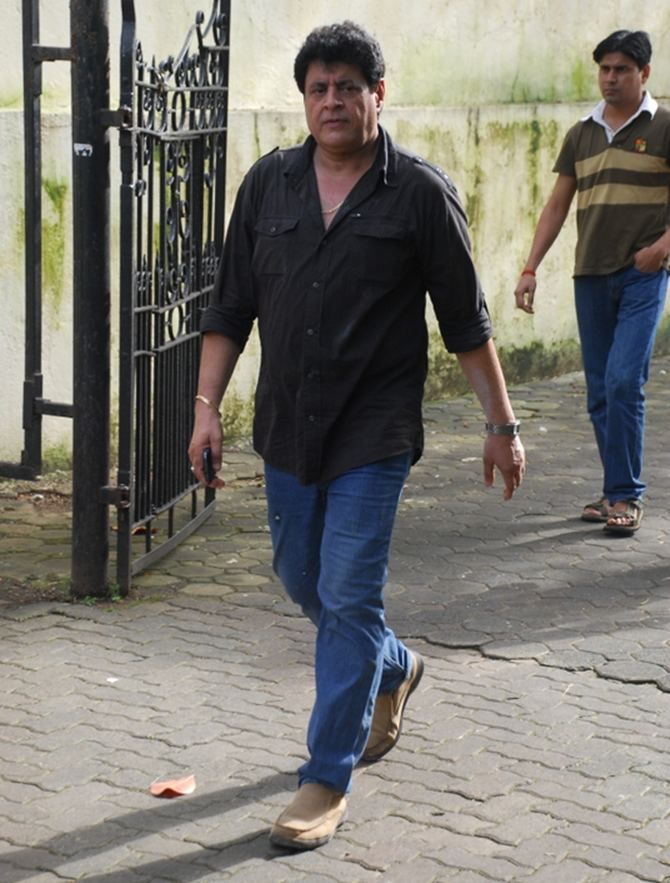 | « Back to article | Print this article |
The opposition to Gajendra Chauhan's appointment has more to do with his background and less with anything else, feels Syed Firdaus Ashraf.

At the height of the communal tension ahead of the Babri Masjid demolition on December 6, 1992, as a college-going youth I saw a telling poster in a suburban Mumbai train that left a lasting impression on me. It said:
First they came for the Socialists, and I did not speak out
Because I was not a Socialist.
Then they came for the Trade Unionists, and I did not speak out
Because I was not a Trade Unionist.
Then they came for the Jews, and I did not speak out
Because I was not a Jew.
Then they came for me
And there was no one left to speak for me.
I then had no idea who had put up this poster or who had written the text since it mentioned no names. Was it meant to alert the citizenry that was getting polarised about the dangers of remaining silent? Maybe. Its timing was too much of a coincidence for it to be otherwise.
In my limited understanding of the subject in those years, my takeaway from the poster was that one has to speak up against injustice, else there won't be anyone left to do so when you are in trouble.
Thanks to Internet tools like Wikipedia I discovered that the words I saw all those years ago on that Mumbai train were written by Pastor Martin Niemoller about the cowardice of German intellectuals following the Nazis' rise to power and the subsequent purges carried out on group after group that were not in sync with the Hitlerian establishment.
Yes, you read that right, group after group.
So what relevance do Pastor Niemoller's words written 70 years ago have to do with Gajendra Chauhan, the newly-appointed chairman of the Film and Television Institute of India, and why should I support him as he faces unprecedented opposition to his appointment from the film fraternity?
Since the Narendra Modi government came to power in May 2014, there has been a systematic erosion of all the values which we know as the 'Idea of India'.
Established and respected institutions are being dismantled bit by bit, their character and composition altered from within, in some cases their chairpersons thrown out and new appointees of a particular hue brought in. But the only reaction from the film industry has been deafening silence.
Whether governors being replaced, educational institutions left leaderless, NGOs targeted, any and all of the government's actions, or sometimes even the saffron brigade's overzealousness, Bollywood personalities have either applauded the moves or been in mum mode.
Some like Aamir Khan, who once stood against Narendra Modi when he was chief minister of Gujarat -- Aamir didn't let his film Fanaa release in Gujarat in support of the Narmada Sarovar's victims -- have done a U-turn once Modi became prime minister.
The going was good for the film fraternity since the government did not touch them. Film folk had a standard Bambaiya response: 'Apney ko kya, aur apni industry ka kya lena dena? (It does not concern me or the film industry).'
Some leading actors joined the bandwagon of Modi bhakts and ran down critics who questioned the prime minister or his Sarkar.
When Rahul Gandhi dubbed the Modi Sarkar as 'Suit-Boot ki Sarkar' in Parliament, Anupam Kher, whose wife Kirron Kher is the BJP Lok Sabha MP from Chandigarh, promptly tweeted: 'Sometimes Suit Boot ki Sarkar is better than a Loot Loot ki Sarkar'
The acclaimed actor has been on maun vrat after LalitGate and the Vyapam scam surfaced. Cat got your tongue, Mr Kher?
The only Bollywood doyen vocal about the Modi Sarkar's excesses was director Mahesh Bhatt. He inexplicably went silent after he received threats from the underworld.
So I am surprised to see Bollywood opposing Gajendra Chauhan's appointment as FTII boss after having remained silent spectators for the last one year.
I understand from Mr Chauhan's CV that he has acted in some 'C-grade' films, and that his only real claim to fame is playing Yudhishtr in B R Chopra's iconic 1980s television serial Mahabharat. But how does that matter?
India's Education Minister Smriti Irani is not a graduate, but everyone gave her a chance to perform. She remains a source of immense inspiration for millions of Indian undergrads who worry about their future in a brutal employment world.
Irani has bravely withstood all the storms raging around her, taken the abuse on her chin, and continued to perform as education minister.
How different is Gajendra Chauhan from Smriti Irani, then?
In an interview to Rediff.com Chauhan had said, "Till the time they don't see my work, how can they decide? Even before sitting for the examination and appearing for the paper I have been failed. That is wrong."
I realise that Bollywood's grouse is not Chauhan per se, what he is, but where he has come from. How can a 'C-grade' actor lead the FTII, which has produced a galaxy of stars over nearly half a century?
If it was say Vinod Khanna, Shatrughan Sinha or, as Gul Panag says, even Kirron Kher, everything would be just fine because they are considered People Like Us. Chauhan clearly is not a Person Like Us.
Is the FTII chairman's post the assured privilege for a chosen few?
Is this not reflective of the scorn with which Congress leader Mani Shankar Aiyar described Narendra Modi as a 'chaiwallah before the 2014 election?
In our country, a chaiwallah can become prime minister, an undergraduate can become education minister, but a 'C-grade' actor cannot become chairman of the FTII.
Then they came for me
And there was no one left to speak for me.
Doesn't this apply to Bollywood?